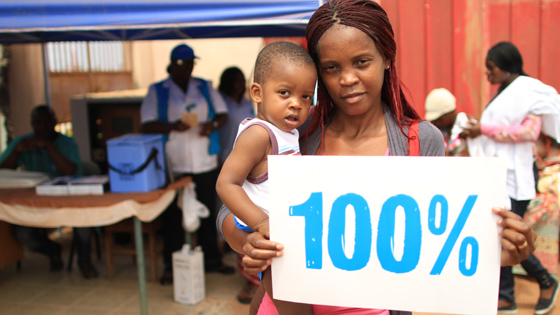
Clerrsio, 17 months, and his mother Albertina arriving at a UNICEF pop-up clinic in Angola. Angola is one of eight countries with the lowest rates of immunization. UNICEF is working to ensure that all children like Clerrsio receive the life-saving immunizations. (Photo: © UNICEF/PFPG2014P-0061/Clark)
This year during UHN's Flu Campaign when you choose prevention, you're not only protecting yourself, your patients and those around you, but you're also ensuring a child in need will receive a vaccine through UNICEF Canada. For every flu vaccine a UHN staff member receives, UHN will donate one vaccine to UNICEF's Let's Vaccinate Every Child campaign.
We spoke with Vanessa Humphries, International Programs Officer for UNICEF Canada, to find out how the campaign and UHN's donations will benefit children around the world.
What is the impact of the Let's Vaccinate Every Child campaign on children around the world?
Each year, 1.5 million children – nearly 4,000 a day – die from diseases that could be prevented by vaccines. These children die from communicable diseases such as pneumonia, diarrhea, whooping cough, measles, influenza, and tetanus – all of which have vaccines to prevent them.
Immunizing children is one of the most efficient, successful and cost-effective ways to save lives.
Through the UNICEF campaign, our goal is to expand immunization services so that all children, even those who are hardest to reach, are provided with the full schedule of lifesaving vaccines against the main preventable diseases.
To do this, the campaign focuses on reaching eight countries that have particularly high routine immunization needs and are polio-endemic or at risk of polio re-infection: Afghanistan, Angola, Chad, Democratic Republic of the Congo, Nigeria, Pakistan, South Sudan and Yemen.
How accessible are vaccines for polio, diphtheria, tetanus, measles and meningitis in the parts of the world where UNICEF works?
Access to vaccinations has greatly increased over the past 30 years. UNICEF has helped to increase routine immunization rates from 20 per cent in the 1980s to 80 per cent today. The world is also closer than ever before to eradicating polio forever – from more than 300,000 infections per year in the early 1990s to just 224 in 2012.
However, about one in five children globally are still not reached with lifesaving vaccines. This means that 22 million children under the age of one are not immunized, exposing them to disabilities or premature death. These children often live in remote areas or are left marginalized through other factors such as poverty, stigmatization and conflict. Some families cannot afford the journey to a health clinic, and in some cases, children are not immunized because their parents are unaware of how vaccination can protect their children.
What happens to children if they do not have regular access to vaccines for polio, diphtheria, tetanus, measles and meningitis?
If children do not have regular access to vaccines, they won't be protected against preventable diseases. It is an ongoing necessity. For example, despite the enormous global successes toward polio eradication, as long as polio exists in one place, it remains a threat to ALL children, everywhere. Were eradication to be halted, we would return to seeing 200,000 cases of polio every year within a decade. This would be a catastrophe, and one we can avoid by staying on track with polio eradication strategies.
How can access to vaccines for polio, diphtheria, tetanus, measles and meningitis change and improve the quality of life for children around the world?
Vaccines are one of the most efficient, successful and cost-effective tools for saving children's lives:
- More than 100 million infants are immunized every year, saving two to three million lives.
- The number of deaths from measles declined by 71 per cent between 2000 and 2012.
- Immunization has resulted in the eradication of smallpox.
- The incidence of polio has decreased by more than 99 per cent. Polio is now endemic in just three countries and we have the opportunity to rid the world of polio forever.
This year, choosing the flu vaccination will help you protect those around you, and will allow a child in need to receive a vaccination.
Let's choose prevention UHN!
To find out more about the Let's Vaccinate Every Child Campaign and others visit UNICEF's website.
